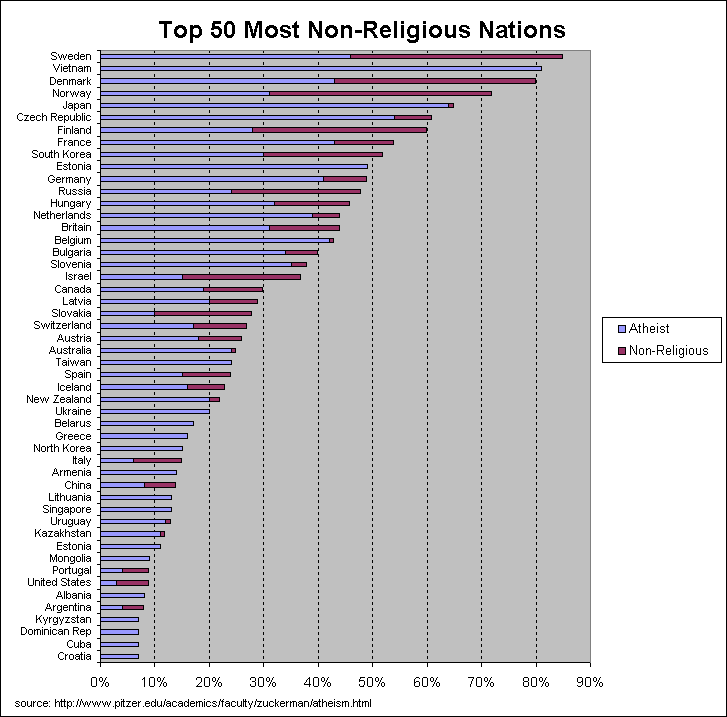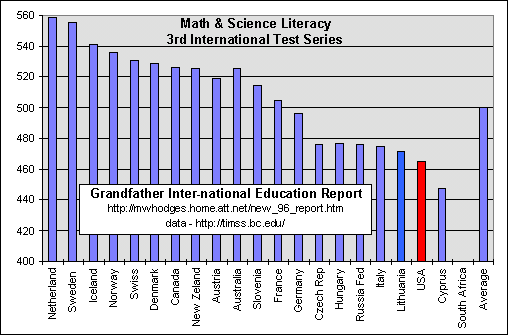Amergin
Well-Known Member
Does belief in religious mythology hamper the learning of subjects like logic, math, and science?
Here is a breakdown of the top literacy levels by subject matter and how the United States places overall.
Mathematical Literacy
The United States ranks 18 overall in mathematical literacy when students are tested at age 15. Here are the countries that ranked in the top 10:
1. Japan
2. South Korea
3. New Zealand
4. Finland
5. Canada
6. Austria
7. UK
8. Switzerland
9. Belgium
10. France
Reading Literacy]/b]
United States’ students are ranked 15 for reading literacy worldwide. These countries ranked higher in this category:
1. Finland
2. Canada
3. New Zealand
4. Austria
5. Ireland
6. South Korea
7. UK
8. Japan
9. Sweden
10. Iceland
Geography Aptitude
Students in the United States rank 96th in the world for geographic aptitude. Here are the countries that ranked highest:
1. Philippines
2. Croatia
3. Liechtenstein
4. Ghana
5. Belgium
6. Brazil
7. Israel
8. Kyrgyzstan
9. Czech Republic
10. Estonia
Scientific Literacy
By age 15, students in the United States place 18th in the world for scientific literacy. Here are the countries, in order, that place in the top 10 positions for scientific literacy:
1. South Korea
2. Japan
3. Finland
4. UK
5. Canada
6. Australia
7. New Zealand
8. Austria
9. Ireland
10. Sweden
The religious landscape in North American is overwhelmingly Christian: about three in four adults identify themselves as Christian; the next largest organized religious groups are Islam and Judaism at about 1%.
Although the importance of religion has been declining in other developed countries, it has remained strong in the U.S.
The United States has a higher level of church attendance than any other country which is "at a comparable level of development."
53% of Americans consider religions to be very important in their lives. This compares with 16% in Britain, 14% in France and 13% in Germany.
Fundamentalistic mythology denies evolution, scientific geology, neuro-biological cognition, quantum physics, and considers advance math to be useless. Does this cause America to lose the competitive edge in science technology considering that 40% of Ph.D. scientists in Graduate Schools and Universities over the next generation?
Amergin
Here is a breakdown of the top literacy levels by subject matter and how the United States places overall.
Mathematical Literacy
The United States ranks 18 overall in mathematical literacy when students are tested at age 15. Here are the countries that ranked in the top 10:
1. Japan
2. South Korea
3. New Zealand
4. Finland
5. Canada
6. Austria
7. UK
8. Switzerland
9. Belgium
10. France
Reading Literacy]/b]
United States’ students are ranked 15 for reading literacy worldwide. These countries ranked higher in this category:
1. Finland
2. Canada
3. New Zealand
4. Austria
5. Ireland
6. South Korea
7. UK
8. Japan
9. Sweden
10. Iceland
Geography Aptitude
Students in the United States rank 96th in the world for geographic aptitude. Here are the countries that ranked highest:
1. Philippines
2. Croatia
3. Liechtenstein
4. Ghana
5. Belgium
6. Brazil
7. Israel
8. Kyrgyzstan
9. Czech Republic
10. Estonia
Scientific Literacy
By age 15, students in the United States place 18th in the world for scientific literacy. Here are the countries, in order, that place in the top 10 positions for scientific literacy:
1. South Korea
2. Japan
3. Finland
4. UK
5. Canada
6. Australia
7. New Zealand
8. Austria
9. Ireland
10. Sweden
The religious landscape in North American is overwhelmingly Christian: about three in four adults identify themselves as Christian; the next largest organized religious groups are Islam and Judaism at about 1%.
Although the importance of religion has been declining in other developed countries, it has remained strong in the U.S.
The United States has a higher level of church attendance than any other country which is "at a comparable level of development."
53% of Americans consider religions to be very important in their lives. This compares with 16% in Britain, 14% in France and 13% in Germany.
Fundamentalistic mythology denies evolution, scientific geology, neuro-biological cognition, quantum physics, and considers advance math to be useless. Does this cause America to lose the competitive edge in science technology considering that 40% of Ph.D. scientists in Graduate Schools and Universities over the next generation?
Amergin


